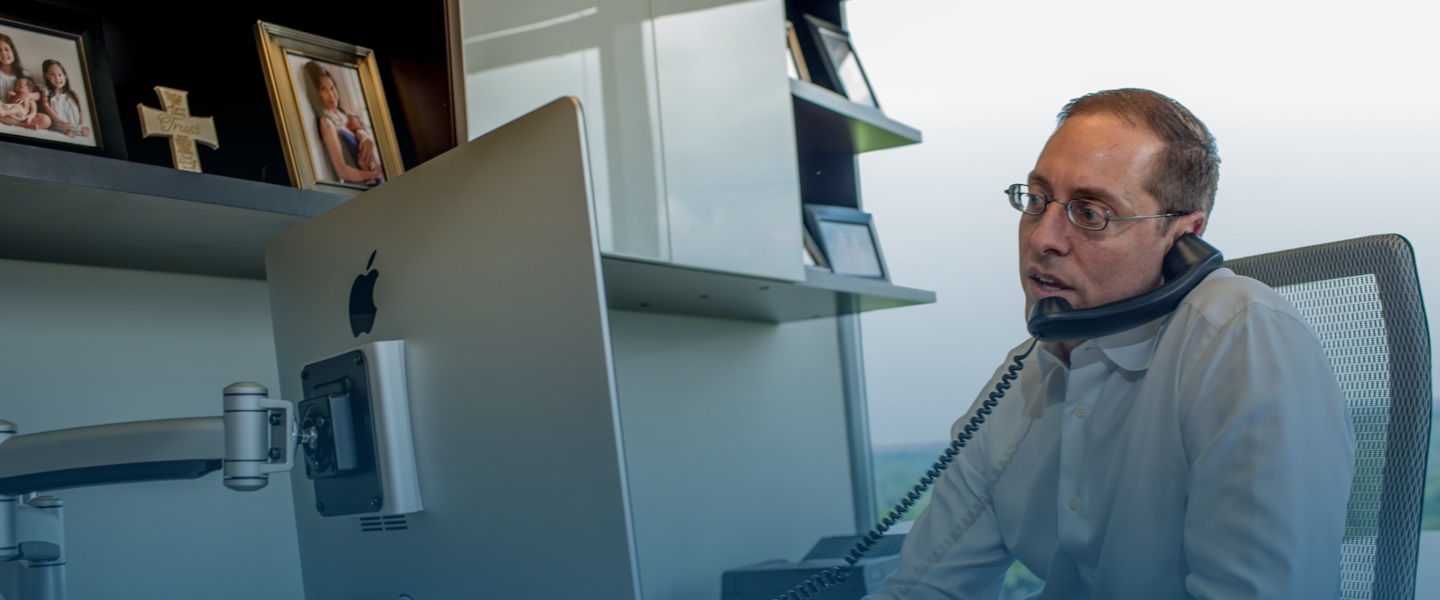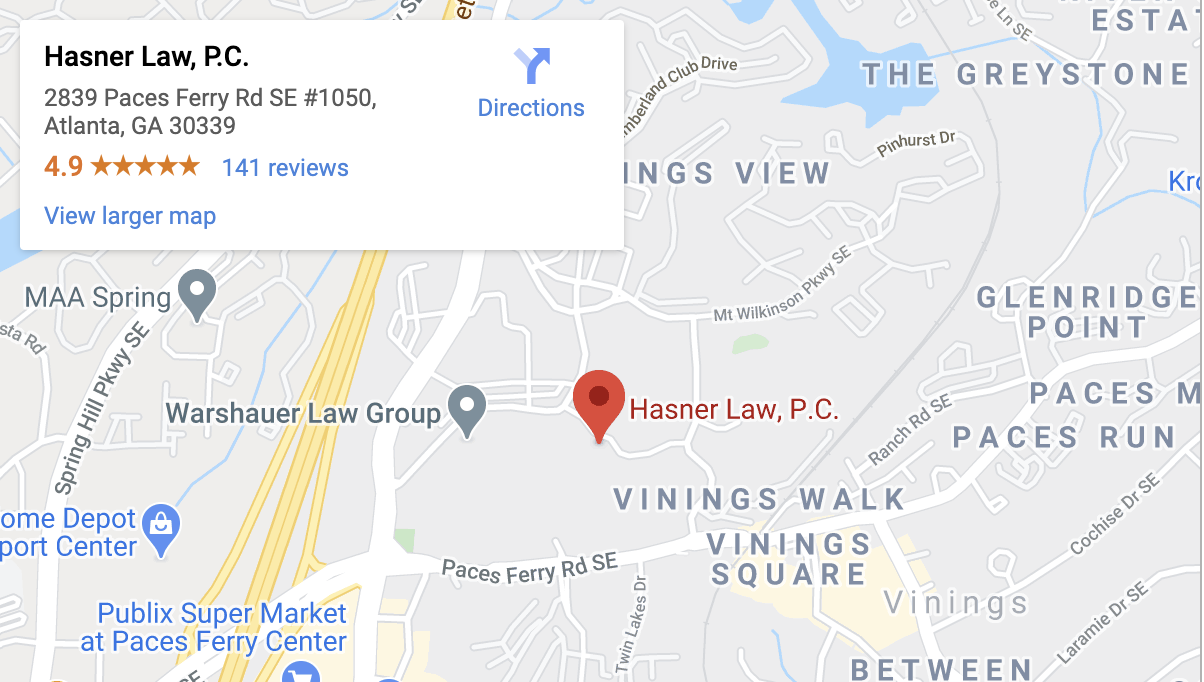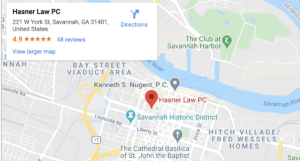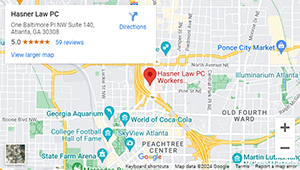Atlanta Workplace Accident Lawyer

Have you been injured at work in Atlanta, GA? Contact Hasner Law Injury & Workers’ Compensation Attorneys for immediate legal assistance. You may be entitled to compensation, and our skilled Atlanta workers compensation lawyers can help you fight to maximize your financial recovery. We have more than 80 years of combined experience and have recovered millions for our injured clients. Now that you’ve gotten hurt on the job, we’ll be there to help you, too.
We offer a free consultation, so give our law firm a call at 678-888-4878 to discuss your case in greater detail today.
Types of Workplace Accidents and Injuries
Workplace accidents are serious and can happen at any time. While some industries are more hazardous to employees than others, the most common on-the-job injuries we see are caused by:
- Falls
- Electrocutions
- Being struck by an object
- Explosions
- Exposure to dangerous chemicals
- Car accidents, and
- Physical stress/strain.
When these accidents lead to serious injuries, we can help you get the compensation you deserve. The types of injuries we regularly see in the workplace include:
- Brain trauma
- Burns
- Loss of sight or hearing
- Infections
- Spinal cord damage
- Broken bones
- Internal organ damage
- Puncture wounds
- Paralysis
- Death
Now, depending on the specific circumstances of your case, you may have one or more options available to you following an on-the-job injury. Because deciding which type of claim to file can be complicated, you will want to have an Atlanta workplace accident attorney involved early on in the process.
Workers’ Compensation for Atlanta Workplace Accidents

The majority of workplace accidents are covered by workers’ compensation. Workers’ comp is a type of insurance that most employers in Georgia are required to carry. It provides money to an injured worker to cover medical bills, rehabilitation costs, and lost income during the period when you are unable to work.
But, bear in mind that there are limits to workers’ compensation coverage. Specifically, these policies only apply if your injury occurs while actually at work performing the duties they were paid to do. This means that you would not be entitled to workers’ compensation benefits if you were injured while on break or during your commute to or from the job.
In addition, while workers’ compensation eligibility begins the first day you start work and applies to both full-time and part-time employees, the coverage does not extend to independent contractors. Further, if you decide to apply for these benefits, you lose your right to sue an employer directly for any additional losses you may have incurred. In other words, filing for workers’ compensation effectively makes it your only legal remedy for your injuries.
However, it’s important to note that one of the major benefits to workers’ compensation is that it is considered no-fault. This means that, unlike a traditional personal injury lawsuit, you don’t need to show that someone was to blame for your injury. Likewise, you could be partially responsible for the accident and still receive benefits.
The Process for Getting Workers’ Compensation in Georgia
Now, there are specific steps that you must follow in order to apply for workers’ compensation following a job-related injury.
First, you must report the accident to your employer as soon as possible. This is important because failure to do so within 30 days could result in you losing your right to coverage.
Seek Medical Attention
Next, you must seek medical attention. Note that Georgia workers’ compensation laws specify that you may only visit a physician that has been pre-approved by your employer. A list of authorized doctors must be provided by the company, and you are allowed to choose any provider on that list.
In cases of emergency, you may instead seek treatment from any hospital or urgent care facility, even those not on the list provided by your employer. Here, you would receive reimbursement for the treatment, but keep in mind that any follow-up care must be sought through an authorized provider.
Once you have obtained your initial treatment, you must then file a claim with the State Board of Workers’ Compensation. The claim needs to also be processed through both your employer and the workers’ compensation insurance company. Keep in mind that there is a one-year deadline for these filings.
You Have the Right to Appeal
In the event that you are denied coverage, or you receive less than you are entitled to receive, you have the right to appeal. Appeals can be complex, so make sure that you have an Atlanta workplace accident attorney assist you with your workers’ compensation case.
What Can I Recover for Workers’ Compensation Claims?

With that in mind, the amount you are entitled to recover based on a workers’ compensation claim depends largely on the extent of your workplace injury. Now, Georgia workers’ compensation will cover your medical bills and rehabilitation expenses, but the law places specific limits on how much you can receive in lost income. This determination is based on which of the following categories your injury falls under:
Temporary partial disabilities
This means that you can continue to work during your recovery, but only in some limited capacity. An example would be if you could only perform light-duty tasks until your broken leg healed. In this case, you would be entitled to two-thirds of the difference between what you earned before and what you can earn now.
Note that there is a cap of $450/week on these benefits, and you can only receive compensation for a maximum of 350 weeks.
Temporary total disabilities
These injuries result in you being completely out of work for a temporary amount of time. The law requires that this period be at least 7 days in order for you to start receiving benefits.
If you qualify, you would be entitled to two-thirds of your previous paycheck, up to $675/week, and for a maximum of 400 weeks, or until you’ve reached what is known as maximum medical improvement. Maximum medical improvement means that you have either reached a treatment plateau or you cannot heal any further with medical intervention.
Permanent partial disabilities
Here, you would only be able to work in a limited capacity as a result of an injury that is not expected to heal. Payments for these injuries would also be two-thirds the difference between what you earned before and what you can earn now, but the length is determined by a schedule outlined in state statute.
For example, according to the schedule, the complete loss of a hand would result in you receiving 160 weeks of benefits. If your specific disability is not listed, there are additional factors taken into consideration. Reach out to an attorney if you have questions regarding how much you are entitled to for a permanent partial disability.
Permanent total disabilities
In this case, you would be considered completely disabled from the injury and unable to return to work. This would entitle you to receive income for the rest of your life. Note that payment may be in the form of a lump sum settlement, depending on what is negotiated with the insurance company.
Premises Liability Claims For Workplace Accidents

While pursuing workers’ compensation is a good option for many employees, you may have reason to file a different type of injury claim. Workers’ compensation has some limitations, such as not providing amounts that cover pain and suffering.
Further, you may not qualify for these benefits due to being an independent contractor or because you weren’t on the clock at the time of the accident. Or, perhaps your employer failed to obtain a workers’ comp policy or is not legally required to do so.
If any of these conditions apply to your case, you may consider instead filing what is known as a premises liability claim. This is a type of personal injury lawsuit, and you will be required to prove that your employer was at fault in some way for your injury. To do so, you must offer evidence that shows the company or one of its officers was to blame.
One way that an employer can be held liable for these types of accidents is if the workplace was not kept reasonably safe. This is a requirement of business owners and Georgia law specifies that they must exercise “ordinary care” in doing so.
Examples of the steps an employer generally must take include:
- Maintaining the property and equipment
- Posting warnings of dangerous hazards
- Complying with safety regulations, and
- Properly training employees on keeping the area safe.
If your employer failed to perform any of these actions, you may be entitled to compensation for the following:
- Medical expenses
- Lost wages
- Diminished earning capacity
- Pain and suffering, and
- Emotional distress.
Note that unlike workers’ compensation, the amounts you can receive are not set by statute. This means that there is more room to negotiate a potentially larger settlement amount.
What Are The Most Important Steps To Take After My Workplace Accident in Atlanta?
Workplace Accident Claim Against a Third Party
Now, sometimes a person other than your employer is responsible for an on-the-job injury. This individual or business is known as a “third-party,” and an example would be if you were assaulted by a coworker. In this case, you may be able to bring a claim against that person directly.
This option may also be available to you if you were injured by a negligent driver on your way to or from work. Like premises liability cases, you would need to prove negligence in order to be successful.
Defective products and machinery can also be grounds to sue a manufacturer or retailer. This is known as a product liability lawsuit, and these cases can be complex and involve several individuals and businesses. For that reason, it’s generally best to speak with a skilled Atlanta personal injury attorney who can help you sort these matters out.
Contact our Atlanta Workplace Accident Attorneys
If you have a work-related injury, contact the skilled legal team at Hasner Law Injury & Workers’ Compensation Attorneys today. Our workers’ compensation and personal injury attorneys will evaluate your case and determine the best option for you.
Do not delay. These types of cases have strict deadlines for filing, and we want to make sure that you get the results you deserve.





